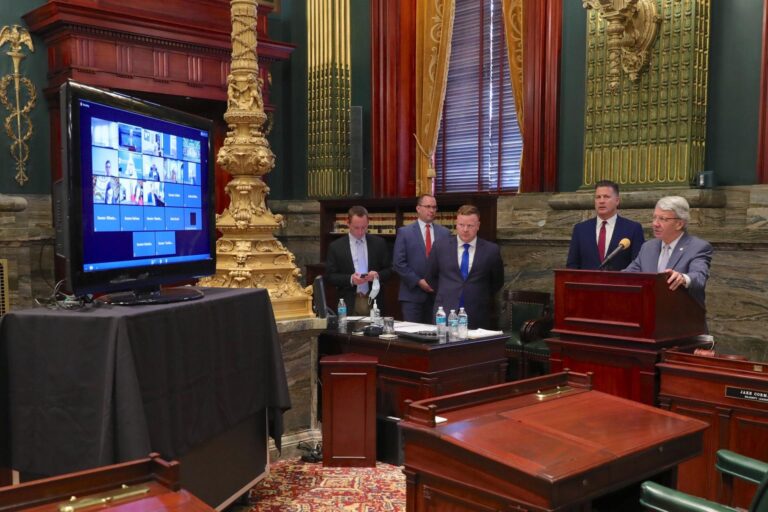Pa. senators threaten subpoena if Wolf administration refuses to turn over list of coronavirus business waivers
If the Pennsylvania legislature issues a subpoena to Wolf for the records, the process could lead to a court fight, which could take months to resolve.

If the Pennsylvania legislature issues a subpoena to Wolf for the records, the process could lead to a court fight, which could take months to resolve. (Courtesy of the Office of Sen. Tom Killion)
This article originally appeared on Spotlight PA.
___
This story was produced as part of a joint effort among Spotlight PA, LNP Media Group, PennLive, PA Post, and WITF to cover how Pennsylvania state government is responding to the coronavirus. Sign up for Spotlight PA’s newsletter.
HARRISBURG — Two Republican state senators are threatening to issue a subpoena if the Wolf administration fails by Wednesday to produce all records related to its secretive process for awarding waivers to allow certain businesses to continue operating during the coronavirus shutdown.
In a letter to Wolf, Sens. Tom Killion (R., Delaware) and Mike Regan (R., York) asked for emails, letters, and other documents related to the process for awarding waivers, which was administered by the Department of Community and Economic Development. The senators are also seeking a list of the waivers that were granted or denied, as well as the administration’s justification for those decisions. The administration has so far refused requests to release the information.
“The next step is a subpoena,” Killion said in an interview.
The senators gave Wolf until the end of the day Wednesday to respond. They stopped short of promising to draw on the legislature’s rarely used option of issuing subpoenas, but did say that they are “prepared to take any appropriate additional steps to compel the delivery of these records.”
Wolf administration officials said they are reviewing the request but did not commit to meeting the deadline.
“The administration is reviewing the letter and will determine how best to respond in light of the extensive resources that have been devoted to addressing this disaster,” said Casey Smith, spokesperson for the Department of Community and Economic Development.
Numerous news organizations — including Spotlight PA, the Inquirer, and the Caucus — have requested copies of all waiver applications and all decisions either granting or denying exemptions. Wolf administration officials have suggested they will eventually make that information public, but have insisted that their immediate priority is responding to the public health crisis. Last week, the secretary of the economic development department said there was no timeline for releasing the list.
The question of which businesses must close and which can stay open during the statewide coronavirus shutdown has been an ongoing point of confusion and anger since March 19, when the governor required all businesses that are not “life-sustaining” to close their physical operations. As part of the shutdown, Wolf created a waiver process that allowed businesses to apply and make an argument about why they should be considered essential.
Many in the business community have complained the exemptions — which could mean the difference between solvency and bankruptcy — were being granted inconsistently. They have also complained the process was unfolding behind closed doors, with no explanation about why waivers were granted or denied.
Killion said his office has received hundreds of calls from businesses upset about the process, with some complaining that they were being forced to close while their competitors remained open.
“There is no transparency,” said Killion, who together with Regan held a joint Senate committee meeting last week to examine the issue of waivers.
Legislative subpoenas are “fairly rare,” said G. Terry Madonna, a political science professor at Franklin and Marshall College.
If the legislature issues a subpoena to Wolf for the records, the process could lead to a court fight, which could take months to resolve, said Madonna.
The process for applying for a waiver closed April 3, with administration officials saying they had received more than 42,300 applications. Earlier this month, officials from the Department of Community and Economic Development said nearly 8,000 had been approved, about 17,000 had been denied, and just over 14,170 were for activities for which no exemption was required.
 100% ESSENTIAL: Spotlight PA relies on funding from foundations and readers like you who are committed to accountability journalism that gets results. If you value this reporting, please give a gift today at spotlightpa.org/donate.
100% ESSENTIAL: Spotlight PA relies on funding from foundations and readers like you who are committed to accountability journalism that gets results. If you value this reporting, please give a gift today at spotlightpa.org/donate.
WHYY is your source for fact-based, in-depth journalism and information. As a nonprofit organization, we rely on financial support from readers like you. Please give today.


![CoronavirusPandemic_1024x512[1]](https://whyy.org/wp-content/uploads/2020/03/CoronavirusPandemic_1024x5121-300x150.jpg)


